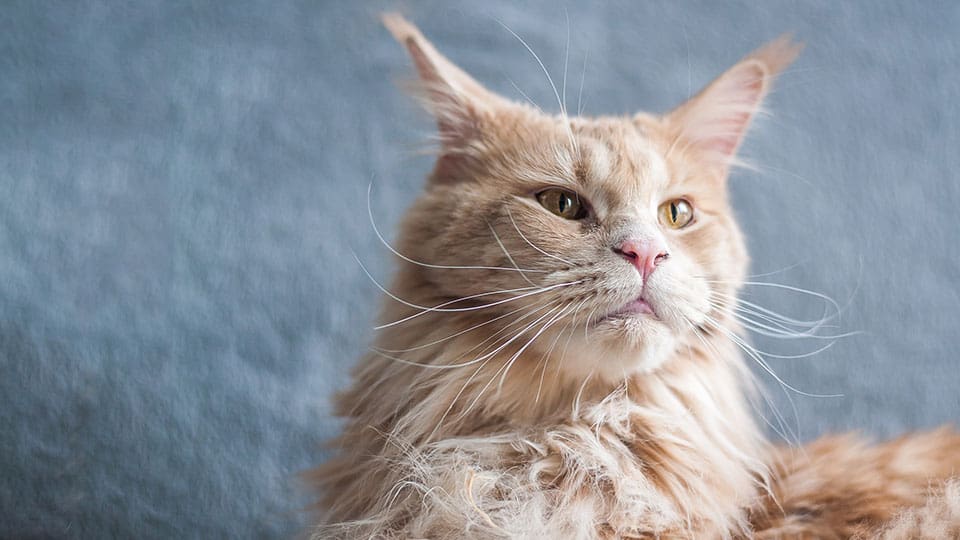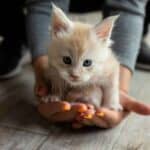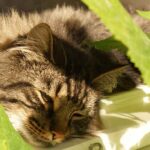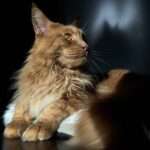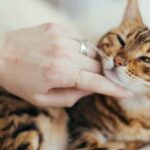Have you ever seen a giant cat as big as a puppy before? That’s probably a Maine Coon.
Maine Coons are often called “gentle giants” due to their large size but charming and affable temperament. They are extremely social cats that form deep bonds with their owners and families.
So, what’s the temperament of Maine Coon?
What's the temperament of Maine Coon?
- Friendliness
Maine Coons are amiable and affectionate cats. They love interacting with people and are always happy to see their owners and guests. They are very tolerant of attention and physical affection.
- Gentleness
Despite their large size, Maine Coons have a gentle and good-natured disposition. They rarely show aggression and tend to be patient and tolerant with children, dogs, and other pets. Proper socialization from an early age helps ensure they remain friendly toward everyone they meet.
- Playfulness
Maine Coons retain a playful kitten-like spirit their whole lives. They enjoy pouncing on toys, chasing feathers or laser pointers, knocking over empty boxes, and other mischievous play. But their playfulness is energetic yet balanced, and they also know when to settle down for naps.
- Intelligence and curiosity
Maine Coons are excellent problem-solvers and tend to be quite curious about the world around them. They frequently explore new spaces and investigate anything that catches their interest. They can be quite vocal in chatting, chirping, meowing and purring with their owners and families.
- Relaxed adaptability
Despite their large size, Maine Coons tend to have an easygoing and adaptable temperament. They can thrive in a variety of living spaces from apartments to large homes. They adjust well to different routines and lifestyles. While playful, they also know how to relax, lounge, snooze and take things at their own pace.
- Nobility
There is a regal, graceful and noble quality to the Maine Coon temperament. They carry themselves poised and dignifiedly yet remain democratic in their affection and bonding. Their stunning looks perfectly match an honorable, balanced nature.
In summary, Maine Coons make excellent family pets, including families with children and other pets. While large, they are not usually aggressive and know how to be gentle around everyone.
Maine Coons see their families as their pack and become very loyal companions. They tend to miss their owners when left alone and eagerly greet them when they return home.
Another cute thing about Maine Coons is that they tend to be vocal cats and use a variety of meows, chirps, trills and other sounds to communicate with their owners. They are very talkative and chatty cats, especially when seeking attention, asking for food or soliciting play. Some even learn to mimic human speech or other noises.
Why are Maine Coons so friendly?
Maine Coons are one of the friendliest and most gentle cat breeds. They are affectionate, patient and enjoy spending time with their owners and families.
There are a few reasons why Maine Coons tend to be so friendly and sociable:
Maine Coons are an old breed that was developed to be companions to humans. They were originally bred as working cats on farms in Maine, helping to hunt rodents and keep barns clean.
This close partnership with people from an early age bred Maine Coons to be very friendly, friendly and bonded closely with their owners. Even today, they continue to thrive on human companionship and interaction.
Maine Coons are also an intelligent breed and can learn to understand and respond to their owners’ commands and wishes.
They pick up on routines and know what their families want from them. This allows them to be very well-behaved, patient and assistive companions.
They do not exhibit aggressive or destructive behavior and instead want to please the people around them.
Another reason for their friendliness is their gentle and relaxed temperament. Maine Coons tend to be very easygoing, peaceful cats. They are not frightened or aggressive animals and tend to greet new people and experience them calmly and positively.
As a result, strangers are viewed as potential new friends. Their relaxed nature also means they get along well with other pets and animals.
Maine Coons also produce a lot of serotonin and other feel-good hormones that promote happiness and joy.
Regular interaction, petting, play and grooming with their owners further boosts the release of these hormones, creating a positive feedback loop of friendship and bonding.
Spending time with their Maine Coon brings smiles, laughter and comfort.
With their intelligence, gentleness, relaxed temperament and hormone-fueled happiness, Maine Coons make amiable and loyal companions.
They may look like traditional cats, but they have the personality of a well-behaved dog. Their friendliness, patience, and love of socializing with families make them unique and endearing.
Why is my Maine Coon so aggressive?
Maine Coons are generally a friendly and gentle breed, so aggression is uncommon but can occur in some circumstances.
There are several possible reasons why a Maine Coon may display aggressive behavior:
- Territoriality
Like many cats, Maine Coons are territorial over their homes, food bowls, litter boxes, etc.
Introducing a new cat or dog into the household could be seen as a threat, causing aggression towards the newcomer.
Protective behavior over familiar territory and resources may also lead to aggression outside the home towards unfamiliar animals.
- Genetics
While rare, some Maine Coons may be genetically predisposed to aggression or possess a dominant, aggressive temperament. Not all Maine Coons inherit the friendly, socialized traits of the breed.
Unaltered male Maine Coons, in particular, may show territorial or competitive aggression due to high testosterone levels.
- Lack of socialization
Early positive experiences with handling, grooming, training and socialization help Maine Coons become well-adjusted, friendly cats.
Without this important socialization during the critical development period, a Maine Coon may become frightened, defensive or prone to aggression.
Proper introductions and training should be done from an early kitten age.
- Medical issue
In some cases, underlying pain, stress, anxiety or a medical problem could contribute to aggressive behavior in a Maine Coon.
For example, conditions like hyperthyroidism, arthritis, dementia, or other illnesses that cause pain or confusion may manifest through aggression or irritability.
If changes in behavior occur, it is best to have a vet examine the cat to rule out any medical causes.
- Negative experiences
Severe trauma, abuse or rough handling and treatment during the cat’s life could make a Maine Coon aggressive and prone to violence.
Harsh discipline, punishment or neglect are unacceptable and will likely damage their trust and temperament. Therefore, only positive, reward-based training should be employed.
While rare in the breed, there are some possible explanations for aggression in Maine Coons. By understanding the potential issues, developing a customized treatment plan, and committing to the proper socialization, training and well-being of a Maine Coon, most aggression problems can be resolved or managed.
With patience, kindness and a good vet’s care, even an aggressive Maine Coon can become a loving companion again.

